An Investigation of Using Discretion in Ordering Criminal Cases by Thai Public Prosecutors Compared with Foreign
Main Article Content
Abstract
This paper describes results of a study to investigate a checking system for using discretion in ordering criminal cases as conducted by Thai public prosecutors compared to the practice done in foreign countries.
Results from the study revealed that use of discretion in ordering criminal cases by public prosecutors as government employees including the decisions made by attorney generals that were to be dismissed would be regarded as final. When the attorney general issues an order not to prosecute the case, it must be terminated according to that order while other agencies could not recheck for legitimacy of such decisions; people cannot participate in investigating the process as in foreign countries. For example, it is examined by the courts or public in Federal Republic of Germany, in Japan, the general public was able to participate in the legitimacy process by appointing a committee of representatives from public to look into the discretion issue even though there are no complaints from people suffered from the wrongdoing. This was to indirectly control the action taken by the public prosecutors. if unfairness action was taken, the committee could file their decision to the head of the prosecutors’ work. It could then be reconsidered for citing such an offense if the case was found to have sufficient evidence. This reflects the intention and needs of the people that might differ from the thoughts of those in the legal circle. Such practice was also seen as being supportive of the democratic process.
The author therefore recommends ways to amend the Code of Criminal Procedure regarding investigation for using discretion in ordering criminal cases as conducted by prosecutors and attorney general, by introducing a system to review the discretion in citing offenses of foreign prosecutors as guideline for amending, revising or drafting of Thai legal system.
Article Details

This work is licensed under a Creative Commons Attribution-NonCommercial-NoDerivatives 4.0 International License.
References
กิตติพงษ์ กิตยารักษ์ และคณะ. (2548). มาตรฐานองค์การสหประชาชาติว่าด้วยกระบวนการยุติธรรมทางอาญา (United Nation Standard on Criminal Justice). กรุงเทพฯ: เดือนตุลา.
คณิต ณ นคร. (2540). อัยการเยอรมันและการดำเนินคดีอาญาของอัยการเยอรมันก่อนฟ้อง. ใน รวมบทความทางวิชาการของ ศ.ดร.คณิต ณ นคร. กรุงเทพฯ: ห้างหุ้นส่วนจำกัดพิมพ์อักษร.
คณิต ณ นคร. (2551). ภูมิธรรมและบทบาทของพนักงานอัยการ. กรุงเทพฯ: วิญญูชน.
คณิต ณ นคร. (2555). กฎหมายวิธีพิจารณาความอาญา. กรุงเทพฯ: วิญญูชน.
จักรพงษ์ วิวัฒน์วานิช. (2553). หลักทฤษฎีการสอบสวน. พิมพ์ครั้งที่ 4. กรุงเทพฯ: บริษัท อภิสภรา อินเตอร์กรุ๊ป จำกัด.
ทวีศักดิ์ ณ ตะกั่วทุ่ง. (2526). งานอัยการของประเทศญี่ปุ่น, ในระบบอัยการในต่างประเทศ. กรุงเทพฯ: กรมอัยการ.
ปกป้อง ศรีสนิท. (2552). ปัญหาการดำเนินคดีอาญาโดยผู้เสียหาย. ใน รวมบทความงานวิชาการประจำปี พ.ศ. 2550. พิมพ์ครั้งที่ 3. ปทุมธานี: โรงพิมพ์มหาวิทยาลัยธรรมศาสตร์.
ประธาน วัฒนวาณิชย์. (2540). กระบวนการยุติธรรมของญี่ปุ่นการสอบสวนและการฟ้องคดีอาญา. อัยการนิเทศ, 59(1-4).
ปิยธิดา เจิมหรรษา. (2540). บทบาทและการใช้ดุลพินิจสั่งไม่ฟ้องคดีอัยการเยอรมัน. เอกสารทางวิชาการเรื่องการตรวจสอบคำสั่งไม่ฟ้องของพนักงานอัยการ. กรุงเทพฯ: สถาบันกฎหมายอาญา.
มหาวิทยาลัยธรรมศาสตร์, คณะนิติศาสตร์. (2555). การนำกระบวนการยุติธรรมทางเลือกมาใช้ในชั้นพนักงานอัยการ: ศึกษาเปรียบเทียบนานาประเทศ. กรุงเทพฯ: โรงพิมพ์เดือนตุลา.
เรวัต ฉ่ำเฉลิม. (2522). ชะลอการฟ้อง (วิทยานิพนธ์ปริญญามหาบัณฑิต). กรุงเทพฯ: จุฬาลงกรณ์มหาวิทยาลัย.
สำนักข่าว BBC NEWS ไทย. (2563). นักวิชาการด้านกฎหมายชี้กระบวนการยุติธรรมไทยถูกมองว่าไม่น่าเชื่อถือ หลังไม่สั่งฟ้องบอส. สืบค้นเมื่อ 2 สิงหาคม 2563, จาก https://www.bbc.com/thai/thailand-53620695.
ศตเนติ เนติภัทรชูโชติ. (2552). มาตรฐานการใช้ดุลพินิจของพนักงานอัยการเกี่ยวกับการสั่งคดีอาญา (วิทยานิพนธ์ปริญญามหาบัณฑิต). กรุงเทพฯ: มหาวิทยาลัยธรรมศาสตร์.
ศิระ บุญภินนท์. (2540). การควบคุมดุลพินิจอัยการในประเทศญี่ปุ่นและการนำระบบการควบคุมดุลพินิจอัยการมาใช้ในประเทศไทย. เอกสารทางวิชาการเรื่อง การตรวจสอบคำสั่งไม่ฟ้องของอัยการ. กรุงเทพฯ: สถาบันกฎหมายอาญา.
ศิระ บุญภินนท์. (มิถุนายน 2541). โครงสร้างกระทรวงยุติธรรมและงานอัยการของญี่ปุ่น. บทบัณฑิตย์. เล่ม 54, ตอน 2.
ศิระ บุญภินนท์. (2542). รายงานการสัมมนาทางวิชาการ เรื่อง การจัดองค์กรในการบริหารงานยุติธรรมตามรัฐธรรมนูญแห่งราชอาณาจักรไทย. กรุงเทพฯ: คณะกรรมาธิการการบริหารและการยุติธรรมวุฒิสภา.
ศิลปะอรัญ ชูเวช และทวีศักดิ์ ณ ตะกั่วทุ่ง. (2526). กระทรวงยุติธรรมของประเทศญี่ปุ่น. ใน ระบบอัยการสากล. กรุงเทพฯ: กรมอัยการ.
Jay A. Sigler. (1979). The Prosecutor : A comparative Functional Analysis, in The Prosecutor. California: Sage Publications.
John H. Langbein. (1974). Controlling Prosecutorial Discretion in Germany. The University of Chicago. Law Review, 1(41), 439.
Joachim Herrmann. (1974). The Rule of compulsory Prosecution and the Scope of Prosecutiorial Discretion in Germany. University of Chicago. Law Review, 41, 469-477.


